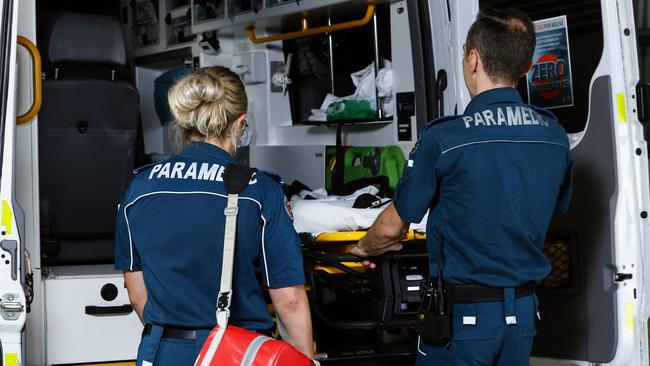Paramedics fight NSW plans for mental health units
NSW’s most ‘dynamic’ paramedics are set to be diverted to mental health interventions, despite union protests.

NSW’s most “dynamic” paramedics have been ordered to handle mental health interventions, despite union protests, after fears of understaffing were aired at an inquest into the Bondi Junction killings.
A plan to incorporate a small group of paramedics trained to provide support in situations that place their own health at risk – known as special operations team paramedics – was formulated in January by NSW Ambulance in reaction to a staffing exodus in the mental health sector. However, the plan was delayed after the Australian Paramedics Association threatened industrial action.
The association and NSW Ambulance faced off in the Industrial Relations Commission on Monday, where the union’s efforts to argue against the move were shot down, despite concerns it would reduce the division’s ability to quickly respond to the most dangerous emergencies other professionals are not qualified to cover.
Commissioner Daniel O’Sullivan ordered late on Monday for specialist paramedics to comply with NSW Ambulance for the duration of the mental health intervention trial.
“NSW Ambulance welcomes the decision by the Industrial Relations Commission, and started the on-road component of the ... trial on Tuesday,” a NSW Ambulance spokesperson said.
“The trial aims to improve the experience for mental health patients by providing a rapid response, assessment and referral to the most appropriate mental health pathway, and by reducing emergency department presentations.”
The APA argued any provision of specialist paramedics to the program – known as the Mental Health Clinician Response Team (MHCRT) – would dwindle their availability further. It estimated current staffing at almost half capacity. APA NSW president Brett Simpson said he had never “seen a (specialist paramedic) roster with a full complement of staff”.
However, NSW Ambulance special operations assistant commissioner Cameron Edgar said that with 196 registered specialist paramedics, the workforce would be able to handle the strain.

“I’ve been shown sufficient information and evidence to make me very comfortable that we can provide the ability to team up a mental health clinical nurse consultant with one of our special operations team.”
APA members said they would refuse to help establish the MHCRT. “Special operations paramedics have specialised training in accessing patients in challenging environments. This includes everything from terrorism incidents to floods. They are not mental health specialists,” APA assistant secretary Gary Wilson said.
“With only a handful of these trained specialists it is crucial they are available when their specialist skills are required, like (during) Bondi.
“If our extremely limited SOT resources are used to cover for Health’s failure to provide appropriate mental health services rather than treated as the scarce, highly specialised essential resources they are, safety will continue to be compromised.”
Last week, a special operations paramedic gave evidence at the Bondi Junction coronial inquest, laying bare alleged failures of communication and staff allocation. The paramedic said it had been difficult to find a special operations team that could respond to the attack given rostering was a “historical problem” and dispatchers initially failed to tell them about the attack.
“I’d made contact with (the) Sydney operations officer when I was subsequently told about the incident,” the paramedic told the court. “The exact words were ‘someone has just gone nuts with a gun at Bondi’.





